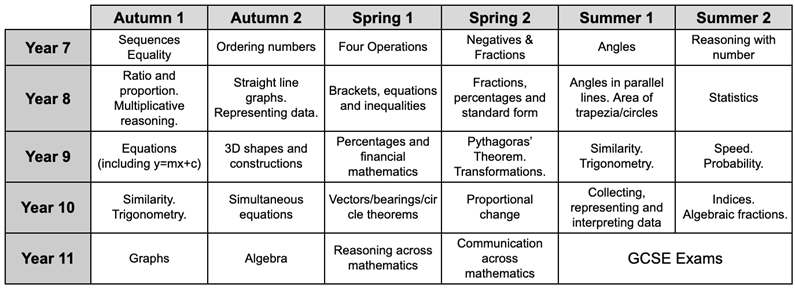MATHS
Curriculum Purpose
Preparing students for life after school
Our curriculum will give students the opportunity to be successful in their chosen career (including giving them the opportunity to choose a career path within STEM). Our students will achieve a P8 score of +1. Students will use their strong mathematical knowledge to make informed decisions within their lives. We know this is vital as “good numeracy is the best protection against unemployment, low wages and poor health” (McCrea, 2013).
Knowledge acquisition as a measure of progress
Students will be given the knowledge (declarative, procedural, conditional and maths for communication) to build a strong understanding of important mathematical concepts. Maths for communication (particularly the meaning of key words) is a vital part of mathematics and must be explicitly taught. The methods we teach should be consistent across the department and future facing (‘teach it right first time’ and ‘never teach anything you’ll need to unteach’).
The needs of our community
Teachers are aware that maths is often associated with anxiety and challenge the misconception that maths is a subject in which you are either right or wrong. Students know that everyone can be successful at maths and always know how they can improve.
Teaching maths for its intrinsic value
We believe that the world is an amazing place and that the study of maths shows us how amazing it is. Students should be given the opportunity to see the beauty and wonder of maths and in particular how different area of maths link (rather than seeing them as a list of distinct topics).
Curriculum Rationale
What do we teach and why do we teach it?
We believe that it is vital that all students leave Trinity Academy with a strong understanding of important mathematical concepts along with excellent numeracy skills. Strong mathematical knowledge supports students to be successful in their chosen career and in making informed decisions within their lives. This is particularly important as “good numeracy is the best protection against unemployment, low wages and poor health” (McCrea, 2013).
The maths department breaks up the mathematical concepts and skills into four types of knowledge – declarative (“I know that…”), procedural (“I know how…”), conditional (“I know when…”) and knowledge for communication. These types of knowledge form the basis of the main topics of number, algebra, ratio and proportion, geometry, statistics and probability. These topics recur as students move up the years and gradually build in complexity and intricacy.
Why do we teach it in that order?
Whilst the selection of maths knowledge is relatively uncontentious, the order in which it is taught can be. Students first learn about algebra as this will be a relatively new concept to all students and can act as a ‘leveller’. It is also a topic that can be later included in all other topics. Students then begin to focus on key number concepts (such as place value, fractions and negative numbers) to develop a firm understanding before moving on to more conceptually challenging topics (such as geometry, probability and statistics). More broadly, in Phase One (Year 7 and 8) there is an emphasis on declarative and procedural knowledge acquisition, with an increasing emphasis on conditional knowledge only after students have mastered the basics.
Curriculum Overview – Maths

